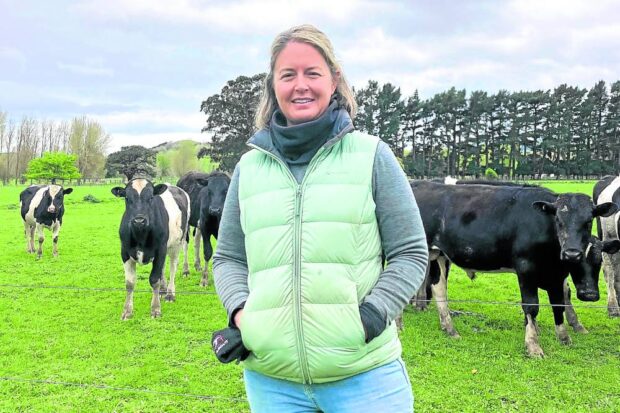Planned ‘burp tax’ on farmers raises prepoll stink in NZ

PRICE OF EMISSIONS Kate Wyeth, a sheep and beef farmer in Wellington, New Zealand, is among those to be affected by a government tax plan that can also influence the rural community vote in Saturday’s general elections. —AFP
WELLINGTON—New Zealand has a plan to tax farmers for their livestock’s burps and farts—and it’s causing a stink ahead of Saturday’s general elections.
The economy is driven by agriculture with around 10 million cattle and 25 million sheep roaming the nation’s pastures.
So in the fight against climate change, New Zealand’s government has targeted livestock as it drives toward a target of net-zero greenhouse gas emissions by 2050.
Just under half of New Zealand’s emissions come from agriculture, and cattle are the main culprits.
Their belches and farts contain methane, which is far less abundant in the atmosphere than carbon dioxide, but is responsible for around 30 percent of the global rise in temperatures to date.
To help combat global warming, New Zealand was one of the first countries to announce it will start pricing agricultural emissions—in effect taxing burps and farts from livestock.
Farmers will be taxed according to farm area, livestock numbers, production and their use of nitrogen fertilizer, in an effort to cut agricultural emissions by between 24 and 47 percent by 2050.
Amid fears the pricing will hurt profits and threaten livelihoods, farmers held nationwide protests last October in New Zealand’s main cities.
Impact on rural vote
A year later and with general elections looming on Saturday, emissions pricing is still weighing on the minds of New Zealand’s farmers.
“I think it will impact on how agricultural rural communities vote this election,” Kate Wyeth, a sheep and beef farmer near the capital Wellington on the North Island, told Agence France-Presse (AFP).
“Particularly whichever party—or group of parties—is looking at giving the agricultural industry time to adapt new technologies that aren’t even available to us yet.”
To give farmers more time to get ready, the Labor government, which lags nationwide in opinion polls, has pushed the start of the emissions pricing back from the first to the fourth quarter of 2025.
Opposition center-right party National has said it will push it back further to 2030 if elected.
Viable business?
Wyeth said that until technologies are developed—for example, feeds given to livestock that reduce methane emissions—farmers feel their only choice is to reduce livestock numbers.
“The technologies aren’t quite here yet to help us,” said Wyeth, vice president of the local farming federation.
“Some of the only ways we are looking at reducing our emissions is by destocking and not running these animals on our farms.”
As a result, Wyeth said, many farmers feel uncertain about the future.
“There’s a massive question at the moment of what does the future hold,” she added. “Is there a viable business, a viable family environment for our kids coming through?”
With livelihoods at stake and uncertainty over how the government will price emissions, opposition parties seem to have firm support in the countryside.
Farmers’ role
In the latest opinion polls by Taxpayers’ Union-Curia last week, around two thirds of rural voters said they intended to opt for either National or classic liberal party ACT.
READ: New Zealand economy pulls away from brink of recession
The government has said emissions pricing is necessary to help fight climate change.
“It is important for New Zealand to lead the way on this because we are one of the world’s leading agricultural countries and agricultural emissions make up half of the total pollution that we put into the atmosphere every year,” James Shaw, the country’s minister for climate change, told AFP.
“Farmers have a really important role to play in the fight against climate change… That’s in large part because farmers are on the front line, their business depends entirely on the climate,” he said. —AFP